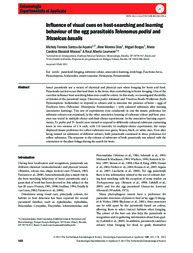Influence of visual cues on host-searching and learning behaviour of the egg parasitoids Telenomus podisi and Trissolcus basalis.
Influence of visual cues on host-searching and learning behaviour of the egg parasitoids Telenomus podisi and Trissolcus basalis.
Author(s): AQUINO, M. F. S. de; DIAS, A. M.; BORGES, M.; MORAES, M. C. B.; LAUMANN, R. A.
Summary: Insect parasitoids use a variety of chemical and physical cues when foraging for hosts and food. Parasitoids can learn cues that lead themto the hosts, thus contributing to better foraging.One of the cues that in?uence host-searching behaviour could be colour. In this study, we investigated the ability of females of the parasitoid wasps Telenomus podisi Ashmead and Trissolcus basalisWollaston (both Hymenoptera: Scelionidae) to respond to colours and to associate the presence of hosts ? eggs of Euschistus heros (Fabricius) (Hemiptera: Pentatomidae) ? with coloured substrates after training (associative learning). Two sets of experiments were conducted: in one the innate preference for substrate colours was examined, in the other associative learning of substrate colour and host presence was tested in multiple-choice and dual-choice experiments. In the associative learning experiments, Te. podisi and Tr. basalis were trained to respond to differently coloured substrates containing hosts in two sessions of 2 h each, with 1-h intervals. In multiple-choice experiments, the wasps displayed innate preference for yellow substrates over green, brown, black, or white ones. Even after being trained on substrates of different colours, both parasitoids continued to show preference for yellow substrates. The response to the colours of substrates of both parasitoids was related with the orientation to the plant foliage during the search for hosts.
Publication year: 2012
Types of publication: Journal article
Observation
Some of Embrapa's publications are published as ePub files. To read them, use or download one of the following free software options to your computer or mobile device. Android: Google Play Books; IOS: iBooks; Windows and Linux: Calibre.
Access other publications
Access the Agricultural Research Database (BDPA) to consult Embrapa's full library collection and records.
Visit Embrapa Bookstore to purchase books and other publications sold by Embrapa.

